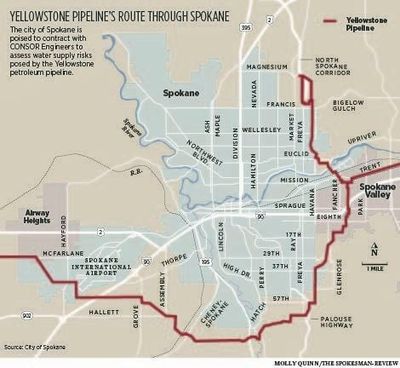Study will gauge risks to Spokane’s water supply from catastrophic leak of Yellowstone pipeline

The Yellowstone petroleum pipeline, which runs from Montana to Washington, travels directly over the largest drinking water source in Spokane.
What happens if the pipeline fails, what are the worst case scenarios and how much would it cost to clean up?
Those are the questions the city hopes to answer with a $273,000 study to assess the risks posed by the unlikely but potentially devastating possibility of a catastrophic leak. The City Council is expected to approve a contract at its Feb. 13 meeting with consulting firm CONSOR Engineers, with results due by the end of the year.
The Yellowstone pipeline, which carries motor fuels to storage facilities in Spokane and Moses Lake, was originally permitted and constructed in the ’50s under the name Salt Lake Pipeline Co.
The pipeline runs within 50 feet of the Parkwater well site, which supplies a large percentage of the city’s drinking water, and a leak could contaminate large swaths of aquifer south of the river.
Federal laws restrict the ability of the city to regulate the pipeline or demand that it be moved, said Council President Breean Beggs.
At the tail end of 2021, the city secured the strongest conditions on the pipeline since it was first constructed, including a $100 million liability insurance policy. But some City Council members have continued to raise concerns.
Beggs, who as an attorney represented the family of one of three people who died in the 1999 Olympic Pipeline explosion in Bellingham, has warned that a worst-case scenario could cost far more than $100 million.
There are fail-safes in place to prevent a catastrophic pipeline spill, including shutoff valves. But Beggs cautioned that those can fail, as occurred in the disastrous Gulf of Mexico oil spill of 2010.
If a spill caused more than $100 million of damages, it would be difficult, if not impossible, to get that money from the pipeline company, Beggs said. Pipeline companies typically don’t have a lot of assets that could be liquidated if they were liable for damages, and the shareholders are largely protected, Beggs said.
How much more a spill could cost is one of the primary focuses of the risk assessment study that will likely be conducted by CONSOR. The pipeline company committed $75,000 to conduct that study, but the city decided to expand its scope, raising the price tag by nearly $200,000, said Colin Naake, associate engineer with Spokane’s integrated capital management department.
The remaining funding is being paid by city water utility rates, Naake added.
“It’s a pittance,” said Councilwoman Lori Kinnear of the pipeline company’s partial contribution to the study.
The study will examine how the city should respond to different scenarios, depending on the severity of a pipe burst or other leak. Results could be used to update the city’s existing emergency response plan. This could include distribution plans to deliver clean water to residents.
The study will also evaluate risks from specific petroleum products transported through the pipeline, looking at the full chemical profile. Consultants will also be expected to draft a conceptual design for a monitoring program that could give additional warning if something goes wrong with the pipeline.
If recovery from a spill looks like it could be extraordinarily expensive, the study could provide leverage for local leaders to petition Congress for reforms, noted Councilman Michael Cathcart.